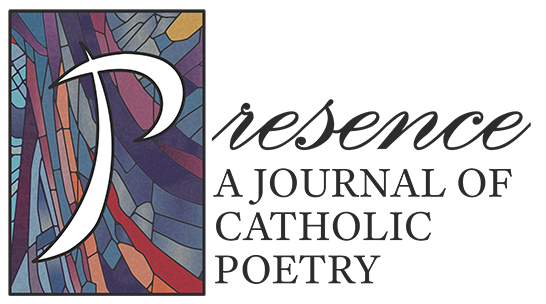Catholic Poetry’s Presence with Mary Ann B. Miller, Ph.D.
interviewed by Matt Chominski
Posted 24 November 2020
Season 1, Episode 20
Below is a transcript of an excerpt from this interview in which Editor-in-Chief Mary Ann B. Miller gives a litany of some of the kinds of “Catholic Poems” that are found among the pages of Presence:
Catholic poems are poems with strong, unique metaphors that suggest a correspondence between the natural world and the supernatural world and often show us how the natural world contains signs of Divine Design
Catholic poems are poems of self-examination (many of them humorous), poems in which the speaker is laughing at his or her sins or spiritual weaknesses and recognizing the need to change them.
Catholic poems are poems that praise the virtues of other poets.
Catholic poems are elegies or other poems that show us a communion between the living and the dead and offer some consolation through some level of belief in the possibility of these souls living on in an afterlife.
Catholic poems are often “parent poems” that show us how the love a father has for his child or a mother has for her child can help us feel the personal love God has for each of us individually
Catholic poems are poems that reflect Ignatian spirituality when the speakers place themselves in the position of a biblical figure and show us their identity as descendants of Adam and Eve or as beneficiaries of God’s promise or as aggressors in Christ’s suffering and death.
Catholic poems sometimes respond directly to other Catholic poets or poems in a kind of intertextual conversation.
or they are ekphrastic poems that reflect upon the spiritual significance of a work of visual art.
Catholic poems are translations of poems in other languages, acts of love to help us see and understand the lives of those from whom we would otherwise be cut off because of language barriers.
Catholic poems are socially conscious, seeking ultimately God’s mercy and justice.
Catholic poems sometimes look back on the speaker’s Catholic upbringing as a child through the eyes of an adult who either struggles with or has come to some kind of deepened understanding of a childlike faith.
Catholic poems are sometimes prayers addressing God directly and showing us some very individual ways to approach the divine: with hope but also often with doubt.
There are so many kinds of Catholic poems that the only way I’ve found to make any broad statement about them is to say that their speakers show us the uniqueness or individuality of every human soul.
They are sacramental poems that reveal to us how God’s grace comes to us through any number of natural means.
Someone who was not Catholic approached me once at a conference and asked, “Aren’t ALL poems ‘catholic poems’?” meaning “catholic” with a small-c and meaning that all poems are spiritual at their core with universal elements. And I said, “Yes! Thank you for saying that because Catholics with a capital ‘C’ can’t say it themselves without sounding like we are appropriating the work of others who may not identify their work as having been formed by a Catholic (with a capital C) worldview.”

